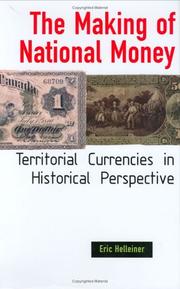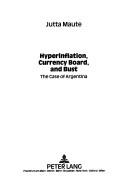| Listing 1 - 3 of 3 |
Sort by
|

ISBN: 1501720724 9781501720727 0801440491 9780801440496 Year: 2018 Publisher: Ithaca, NY : Cornell University Press,
Abstract | Keywords | Export | Availability | Bookmark
 Loading...
Loading...Choose an application
- Reference Manager
- EndNote
- RefWorks (Direct export to RefWorks)
Why should each country have its own exclusive currency? Eric Helleiner offers a fascinating and unique perspective on this question in his accessible history of the origins of national money. Our contemporary understandings of national currency are, Helleiner shows, surprisingly recent. Based on standardized technologies of production and extraction, territorially exclusive national currencies emerged for the first time only during the nineteenth century. This major change involved a narrow definition of legal tender and the exclusion of tokens of value issued outside the national territory. "Territorial currencies" rapidly became bound up with the rise of national markets, and money reflected basic questions of national identity and self-presentation: In what way should money be managed to serve national goals? Whose pictures should go on the banknotes? Helleiner draws out the potent implications of this largely unknown history for today's context. Territorial currencies face challenges from many monetary innovations-the creation of the euro, dollarization, the spread of local currencies, and the prospect of privately issued electronic currencies. While these challenges are dramatic, the author argues that their significance should not be overstated. Even in their short historical life, territorial currencies have never been as dominant as conventional wisdom suggests. The future of this kind of currency, Helleiner contends, depends on political struggles across the globe, struggles that echo those at the birth of national money.
Currency question. --- Money --- Money. --- Currency --- Monetary question --- Money, Primitive --- Specie --- Standard of value --- Exchange --- Finance --- Value --- Banks and banking --- Coinage --- Currency question --- Gold --- Silver --- Silver question --- Wealth --- Fiat money --- Free coinage --- Scrip --- Currency crises --- Finance, Public --- Legal tender --- Political aspects.

ISBN: 363155608X 0820487082 3631754477 9783631754474 Year: 2018 Publisher: Bern Peter Lang International Academic Publishing Group
Abstract | Keywords | Export | Availability | Bookmark
 Loading...
Loading...Choose an application
- Reference Manager
- EndNote
- RefWorks (Direct export to RefWorks)
This book focuses on «Convertibilidad», the latest Argentine experience of exchange rate based stabilisation, and aims at isolating the main causes for its tragic collapse in 2001-2002. The characteristics of Argentina’s high and hyperinflation during the 1980s are analysed, and the theory of currency boards is expounded. The stabilisation tool, an institutionally highly credible currency board arrangement (CBA), though highly effective, could not be an optimal long-term solution, given the country’s structural and trade characteristics. The analysis of the causes of the CBA’s collapse yields a complex picture of interacting factors, among them invaliding ones that had created multiple vulnerabilities over years, and triggering ones that unfolded their worst potential in meeting such vulnerable conditions.
Currency boards --- -Monetary policy --- -Currency question --- -332.410982 --- Fiat money --- Free coinage --- Monetary question --- Scrip --- Currency crises --- Finance --- Finance, Public --- Legal tender --- Money --- Monetary management --- Economic policy --- Money supply --- Financial institutions --- Monetary policy --- Argentina --- Argentina. --- Argentine Currency Board --- Argentine Republic. --- Monetary economics --- Development economics & emerging economies --- Environmental economics --- Political economy --- Currency question --- Argentinien --- Board --- Bust --- Case --- Currency --- Currency Board --- Fixed Exchange Rates --- Geschichte 1980-2002 --- Hyperinflation --- IMF --- Inflation --- IWF --- Konvertierbarkeit --- Maute --- Währung --- Washington Consensus --- Wechselkurs
Book
ISBN: 1400888573 Year: 2018 Publisher: Princeton : Princeton University Press,
Abstract | Keywords | Export | Availability | Bookmark
 Loading...
Loading...Choose an application
- Reference Manager
- EndNote
- RefWorks (Direct export to RefWorks)
A powerful new understanding of global currency trends, including the rise of the Chinese yuanAt first glance, the modern history of the global economic system seems to support the long-held view that the leading world power's currency-the British pound, the U.S. dollar, and perhaps someday the Chinese yuan-invariably dominates international trade and finance. In How Global Currencies Work, three noted economists provide a reassessment of this history and the theories behind the conventional wisdom.Offering a new history of global finance over the past two centuries, and marshaling extensive new data to test established theories of how global currencies work, Barry Eichengreen, Arnaud Mehl, and Livia Chiţu argue for a new view, in which several national monies can share international currency status, and their importance can change rapidly. They demonstrate how changes in technology and in the structure of international trade and finance have reshaped the landscape of international currencies so that several international financial standards can coexist. They show that multiple international and reserve currencies have in fact coexisted in the pastupending the traditional view of the British pound's dominance prior to 1945 and the U.S. dollar's dominance more recently.Looking forward, the book tackles the implications of this new framework for major questions facing the future of the international monetary system, from whether the euro and the Chinese yuan might address their respective challenges and perhaps rival the dollar, to how increased currency competition might affect global financial stability.
Valute. --- Money. --- International finance. --- Account (accountancy). --- Annual report. --- Asset. --- Balance sheet. --- Bank for International Settlements. --- Bank of England. --- Bank of Japan. --- Bank rate. --- Bank. --- Barry Eichengreen. --- Bond (finance). --- Bretton Woods system. --- Canadian dollar. --- Capital control. --- Capital market. --- Central bank. --- Commodity. --- Credibility. --- Credit (finance). --- Credit risk. --- Currency Internationalization. --- Currency competition. --- Currency swap. --- Currency. --- Current account. --- Customer. --- Debt. --- Deflation. --- Determinant. --- Deutsche Mark. --- Devaluation. --- Discounts and allowances. --- Economics. --- Economist. --- Economy. --- Endogeneity (econometrics). --- Estimation. --- European Central Bank. --- Exchange rate. --- Export. --- Federal Reserve Bank. --- Fiat money. --- Finance. --- Financial crisis. --- Financial deepening. --- Financial institution. --- Financial transaction. --- Foreign Exchange Reserves. --- Foreign direct investment. --- Foreign exchange market. --- French franc. --- Gold reserve. --- Gold standard. --- Government debt. --- Gross world product. --- Import. --- Inflation. --- Institution. --- Interest rate. --- International Monetary Fund. --- International monetary systems. --- International trade. --- Internationalization. --- Investment. --- Investor. --- Invoice. --- Issuer. --- Liberalization. --- Local currency. --- Market capitalization. --- Market liquidity. --- Market participant. --- Monetary policy. --- Money market. --- Natural monopoly. --- Network effect. --- Payment. --- Pound sterling. --- Receipt. --- Renminbi. --- Reserve currency. --- Securitization. --- Security (finance). --- Sterling area. --- Store of value. --- Supply (economics). --- Swiss franc. --- Tax. --- Trade credit. --- Treasury Bill. --- U.S. Bancorp. --- Underwriting. --- Unit of account. --- United States dollar. --- Valuation effects. --- World War II. --- World currency. --- World economy.
| Listing 1 - 3 of 3 |
Sort by
|

 Search
Search Feedback
Feedback About
About Help
Help News
News